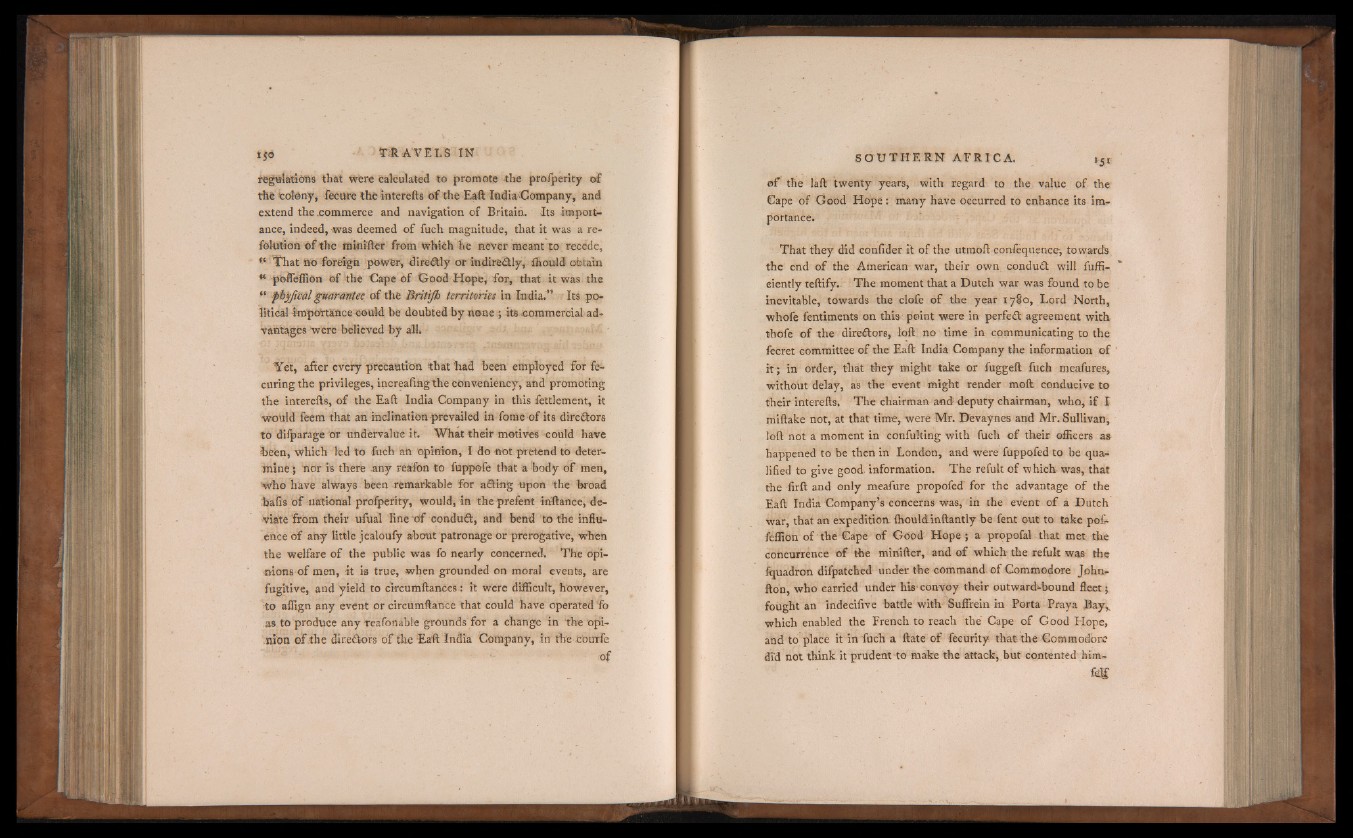
regulations that were calculated to promote the prosperity of
the Colony, Secure the interefts of the Eaft IndiaCompany, and
extend the .commerce and navigation of Britain. Its importance,
indeed, was deemed of Such magnitude, that it was a re-
folutkm ofthc minister from which he never meant to recede,
** That no foreign power, diredtly or indire&ly, Should obtain
“ poffeilion of the Cape of Good Hope, for, that it was the
“ phjrjiial guarantee of the Britijb territories in India.” -Its political
importance could be doubted by none; its .commercial advantages
were believed by all.
Yet, after every precaution that had been employed for Securing
the privileges, increafing the conveniency, and promoting
the interefts, of the Eaft India Company in this Settlement, it
would feem that an inclination prevailed in fome of its directors
to disparage or undervalue it. What their motives could have
been, which led to Such ah opinion, I do not pretend to determine
; nor is there any reaSon to SuppoSe that a body of men,
who have always been remarkable for adtmg upon the broad
balls of national profperity, would, in the prefent iriftance, deviate'from
their ufual Hne df conduit, and bend to the influence
of any little jealoufy about patronage or prerogative, when
the welfare of the public was fo nearly concerned. The opinions
of men, it is true, when grounded on moral events, are
fugitive, and yield to ctrcumftances: it were difficult, however,
to affign any event or circumftance that could have operated fo
as to produce any reafonable grounds for a change in the'opinion
of the dir,e£k>rs of the -Eafft India Company, in theCourfe
o f the laft twenty years, with regard to the value of the
Cape of Good Hope ; many have occurred to enhance its importance.
That they did confider it of the utraoft confequenee-, towards
the end of the American war, their own conduit will fuffi-
eiently teftify. ‘ The moment that a Dutch war was found to be
inevitable, towards the clofe of the year 1780, Lord North,
whofe fentiments on this point were in perfeit agreement with
thofe of the direitors, loft no time in communicating to the
fecret committee of the Eaft India Company the information of ‘
it; in order, that they might take or fuggeft fuch meafures,
without delay, as the event might render moft conducive to
their interefts, The chairman and deputy chairman, who, if I
miftake not, at that time, were Mr. Devaynes and Mr. Sullivan,
loft not a moment in confulting with fuch of their officers as
happened to be then in London, and were fuppofed to be qualified
to give good, information. The refult of which was, that
the firft and only meafure propofed for the advantage of the
Eaft India Company’s concerns was, in the event of à Dutch
war, that an expedition, (hould.inftantly be fent out to take pof-
feffion of the Cape of Good Hope; a prppofal - that met the
concurrence of the minifter, and of which- the refult was the
fouadron difpatched under the command of Commodore John-
fton, who carried under his-convoy their outwards-bound fleet ;
fought an indecifive battle with SufFrein m Porta Praya Bay,,
which enabled the French to reach the Cape of Good Hope,
and to place it in fuch a ftate of fecurity that the Commodore
did not think it prudent to make the attack, but contented himfcK